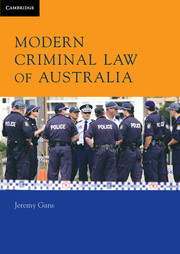3 - Conduct
Summary
Introduction
The previous chapters described Australia’s criminal law as a marriage of the words in each statutory offence and the people who make choices about enforcing each offence. This chapter introduces the third (and final) partner: each Australian jurisdiction also has a ‘general criminal law’, which strongly influences (and often determines) many questions about whether or not someone is a criminal.
This chapter outlines both the notion of a general criminal law and one of the general law’s foundational concepts: criminal conduct. Section 3.2 sets out the central but difficult role played by conduct in Australian criminal justice and the way that the general criminal law may solve some of those difficulties. The remaining sections respectively set out the general criminal law’s conditions for making people criminally responsible for their conduct and noteworthy scenarios when those conditions may not be satisfied.
- Type
- Chapter
- Information
- Modern Criminal Law of Australia , pp. 67 - 97Publisher: Cambridge University PressPrint publication year: 2011



